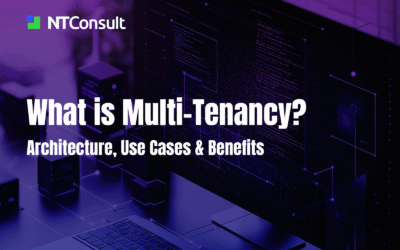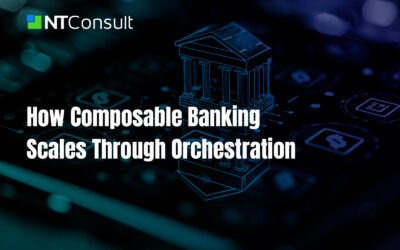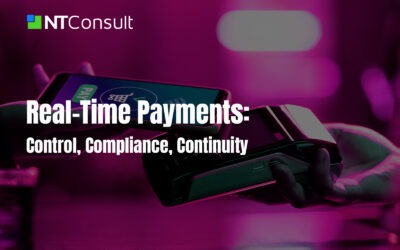Salesforce Agentforce is an enterprise-grade AI platform designed to transform service operations. In high-stakes industries like banking and insurance, where regulatory pressure and operational scale converge, traditional automation is no longer sufficient. Agentforce combines real-time intelligence, case automation, and embedded compliance to streamline service workflows without sacrificing control.
But unlocking its potential requires more than turning on features. Effective deployment depends on architectural alignment, integration with legacy systems, and the ability to adapt AI models to regulated environments. That’s where a strategic implementation partner comes in: helping enterprises deploy Agentforce in a way that delivers measurable returns, system continuity, and long-term efficiency.
In this text, we explore what sets Salesforce Agentforce apart from traditional automation platforms. We examine how it can be architected and integrated into complex enterprise environments. Finally, we explain why a strategic approach, rooted in Agentic AI principles, is key to achieving sustainable results.
What Is Salesforce Agentforce and why it’s a game-changer
Salesforce Agentforce is an enterprise-ready service intelligence platform that merges Einstein Copilot, live CRM data, and automated workflows to support AI-driven decisions across customer interactions, all within a controlled and compliant environment.
This evolution matters for organizations handling large volumes of service requests and regulatory scrutiny. Agentforce replaces reactive case handling with intelligent triage, contextual guidance, and proactive resolution, reducing operational friction while maintaining accuracy.
In banking, it accelerates tasks like transaction validation, fraud detection, and secure client communication. In insurance, it streamlines claims intake, supports regulatory checks, and reduces manual handoffs in policy administration.
Deploying Agentforce successfully requires more than feature activation. It must be mapped to the enterprise’s service architecture, aligned with business workflows, and monitored against performance indicators. NTConsult supports this process by helping organizations translate Agentforce’s capabilities into scalable, measurable service improvements.
Key features of Agentforce that enable intelligent service at scale
Agentforce is designed for enterprise operations that demand precision, scale, and traceability. Its core features go beyond productivity tools to form the foundation of AI-assisted service governance.
Key capabilities include:
- Automated case triage that categorizes and routes service requests based on historical data, urgency, and customer profile.
- AI-assisted resolutions that recommend next steps to agents or resolve common issues directly, reducing handling time and errors.
- Real-time data surfacing that brings relevant client data, risk indicators, and compliance flags into the agent interface without switching tools.
- Embedded compliance logic that ensures all actions follow regulatory and internal policy requirements.
- Agent productivity dashboards that track SLA adherence, resolution speed, and AI effectiveness for continuous improvement.
Einstein Copilot and Service GPT are not bolt-ons. They are embedded into the service flow, guiding each decision with contextual awareness. In contact centers, this reduces repeat interactions and empowers agents. In finance, it supports audit readiness and risk-based case handling. In insurance, it enforces consistency in claims decisions and communications.
NTConsult tailors these features to match enterprise goals and architecture. We tune AI outputs, configure guardrails, and connect service workflows to existing KPIs, ensuring that the technology supports measurable business outcomes.
Architecting Salesforce Agentforce for enterprise environments
Deploying Agentforce at scale is not a plug-and-play task. Large organizations operate in environments shaped by legacy systems, compliance mandates, and distributed teams. Success depends on a tailored architecture that ensures security, flexibility, and long-term performance.
Enterprise implementation requires attention to several critical layers:
- Solution architecture that defines how Agentforce interacts with existing CRMs, data platforms, and operational workflows.
- Governance models to control AI behavior, manage access, and enforce compliance across regions and business units.
- Integration planning that maps how Agentforce fits into service ecosystems, including data lakes, compliance engines, and legacy BSS/OSS platforms.
Agentforce deployments also introduce the need for Agentic AI principles, where autonomous agents act within defined boundaries, interpret business context, and maintain human oversight. For this end, it is fundamental to design AI governance frameworks that support this model, balancing automation power with accountability and control.
NTConsult brings architectural leadership grounded in experience with regulated, high-scale environments. Our teams work alongside enterprise architects to design orchestration layers that connect Agentforce to existing systems without disrupting operational continuity. This includes aligning AI behavior with compliance requirements, defining role-based access models, and adapting workflows to reflect real business rules rather than generic templates.
In financial services, for instance, we have integrated Agentforce with fraud detection platforms and data loss prevention frameworks, ensuring secure and auditable interactions. In telecom, we’ve connected the platform to OSS/BSS environments to support real-time provisioning and fault management. These implementations reflect a consistent principle: architecture must enable business strategy, not constrain it.
Integrating Agentforce with existing Salesforce and third-party systems
For most enterprises, Agentforce must operate within a complex digital environment. This includes not only Salesforce-native tools like Service Cloud and Data Cloud, but also third-party platforms such as ERPs, IVRs, fraud detection engines, and compliance monitoring systems.
Successful integration starts with architecture-aware planning. NTConsult works with clients to map dependencies, data flows, and system roles across the service stack. We design middleware and API layers that allow Agentforce to communicate in real time without compromising system performance or data governance.
Common integration strategies include:
- Salesforce-native sync with Service Cloud case records and Data Cloud profiles, enabling unified customer views.
- API orchestration that connects Agentforce to external services like identity verification, risk scoring, or billing systems.
- Event-driven triggers that allow Agentforce to act based on real-time inputs from chat platforms, IVRs, or transaction logs.
- Data mapping and compliance filters that enforce region-specific controls, retention policies, and access restrictions.
NTConsult has worked with enterprise clients in finance, insurance, and telecom to integrate Salesforce solutions within legacy-rich and compliance-sensitive environments. Our approach prioritizes performance and transparency, with architectures that support audit requirements, enforce SLA adherence, and reduce operational load on internal IT teams through well-documented, resilient integration layers.
Use cases in Telecom and Finance: real outcomes with Agentforce
Agentforce delivers its strongest impact when aligned to real operational challenges. In sectors like telecom and finance, where service interactions are high-volume, time-sensitive, and compliance-bound, AI-powered automation can generate tangible improvements.
Finance and Insurance
In banking and insurance, Agentforce supports secure, compliant client service across multiple touchpoints. Examples include:
- Automating client verification and case triage in call centers and online channels.
- Enabling intelligent case tracking for disputes, onboarding, and account management.
- Flagging regulatory events through real-time policy analysis and embedded compliance logic.
- Powering fraud alert workflows based on transaction anomalies or behavioral signals.
A global insurance client, supported by NTConsult, used Agentforce to automate repetitive intake steps in the claims process. This reduced average handling time by 27 percent while maintaining regulatory audit readiness.
Telecom
In telecom, Agentforce enables scalable customer service across technical and commercial operations. Use cases include:
- Routing technical issues based on device telemetry and support history.
- Launching self-healing bots for common device or service errors.
- Generating next-best actions for retention or upsell based on network usage patterns.
- Enabling dynamic knowledge suggestions for agents during live interactions.
In one telecom deployment, Agentforce was integrated into an existing OSS/BSS environment to support intelligent fault management. This led to a 35 percent reduction in escalated tickets and measurable gains in SLA performance.
These outcomes reflect the complexity of integrating AI into high-volume, latency-sensitive systems. Success depends on deep alignment between the platform’s capabilities and the realities of the operational environment, including legacy constraints, compliance obligations, and service-level expectations.
Why strategic implementation matters: beyond platform activation
Enterprise platforms like Agentforce are only as effective as the strategy behind their implementation. Activating AI features without alignment to process architecture, compliance rules, and performance goals often results in superficial gains and fragmented service.
NTConsult takes a strategy-first approach to Agentforce deployments. Our methodology begins with collaborative workshops that map business objectives, user roles, and operational constraints. From there, we define architecture blueprints, governance structures, and AI usage policies that reflect the client’s environment.
This includes defining how AI agents operate under Agentic AI principles, where autonomy is structured, decisions are traceable, and outcomes are aligned with enterprise policy and regulation.
Key implementation practices include:
- Business-centric discovery sessions to align priorities and define measurable outcomes.
- Agile delivery frameworks with stakeholder checkpoints and transparent scope control.
- AI training governance to monitor model behavior, mitigate drift, and ensure compliance.
- Cross-functional collaboration that includes legal, risk, IT, and service operations teams from day one.
This structured approach helps enterprises avoid common pitfalls, such as disconnected data flows, unmanaged AI outputs, or integration fatigue. It also enables faster value realization, as each phase builds on validated architecture and stakeholder alignment.
Clients choose NTConsult not for short-term delivery, but for long-term transformation. Our experience with AI-infused service architectures, certified Salesforce capabilities, and domain expertise in finance and telecom positions us as a trusted partner in high-stakes environments.
Salesforce Agentforce redefines how enterprise support operates, but only when deployed with architectural rigor and strategic intent. For organizations in finance and telecom, the real value comes not from AI features alone, but from intelligent orchestration, robust integration, and measurable business outcomes.
NTConsult helps enterprise leaders bridge the gap between platform potential and operational performance. With a certified team, proven frameworks, and deep experience in regulated environments, we deliver Agentforce implementations that scale with confidence.
Looking to scale your service operations with intelligence and control?
Talk to NTConsult to explore how we design, implement, and optimize Agentforce architectures tailored to enterprise realities.
Talk to our Salesforce experts
Frequently Asked Questions (FAQ)
Begin with measurable outcomes. Demonstrate gains such as reduced handling time, fewer escalations, and improved SLA performance. More importantly, show how the AI operates within compliance frameworks, with clear audit trails. ROI becomes credible when efficiency and risk governance advance together.
2. Can we trust an AI system to make decisions in a regulated environment and still remain audit-ready?
Yes, but only with the right architecture. Agentforce can be configured with embedded compliance logic, decision boundaries, and full traceability. This ensures that AI agents operate within approved parameters, enabling automation without compromising oversight.
3. Will integrating Agentforce disrupt what’s already working or create hidden complexity for my teams?
Not when the deployment is guided by architectural awareness. A well-integrated implementation will enhance current workflows, not replace them. It reduces manual interventions and improves data access without burdening existing systems or teams.
4. How do I avoid depending on a platform I can’t fully control or explain to stakeholders?
Ownership begins with transparency. When implementation prioritizes visibility into AI logic, data flow, and integration points, organizations retain control. This avoids black-box behavior and allows internal teams to govern and evolve the solution on their terms.
5. Who can help implement this in a way that respects our legacy systems and compliance obligations?
The right partner will bring experience in both modern platforms and legacy-heavy environments. What matters is the ability to adapt the solution to your ecosystem, aligning automation with your regulatory context, data policies, and operational goals.


 Portuguese
Portuguese


